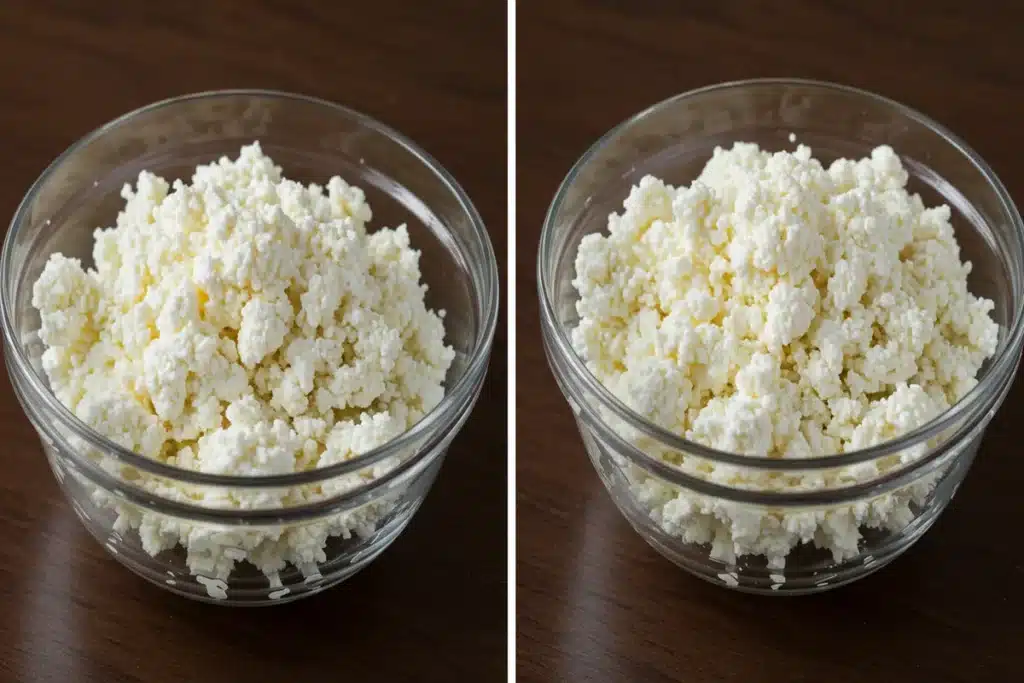Wondering, why are my eggs watery when I add cottage cheese? This article explores the causes of watery eggs.
Why are my eggs watery when I add cottage cheese? This is a common question for those who enjoy this combination. Cottage cheese can make eggs watery if not used correctly. This article will explain why. We will explore the science behind the reaction and offer tips to prevent it. Ultimately, this information will help you prepare great eggs with cottage cheese.
Understanding the Water Content in Cottage Cheese
Cottage cheese has a high water content. It’s made up of cheese curds and whey. The whey is the liquid portion of milk. This liquid can get released during cooking, or when combined with other items. Therefore, understanding this water content is essential. It will help explain why your eggs become watery when you add cottage cheese.
The Whey Factor and its Release
The liquid in cottage cheese, or whey, is chiefly responsible for the water. Additionally, heat and mixing can cause the whey to separate from the curds. This released whey can then make eggs watery. Therefore, this whey factor is important to keep in mind. It will help to understand the nature of cottage cheese. It also helps understand how it can affect other items. We also have to remember that whey is made up of several things, and can affect your recipe in varied ways.
How Cottage Cheese Affects Eggs
When cottage cheese is added to eggs, the liquid can combine with the eggs. This can cause the eggs to become diluted. Additionally, the heat of cooking will cause even more liquid to release. Consequently, the result is often watery eggs. This happens because the cottage cheese is releasing liquid. This combines with the eggs. This is also often affected by the ratio you use. The more cottage cheese, the more of a watery result you can expect.
Dilution of Eggs and Liquid Release
The water in cottage cheese dilutes the eggs. The eggs become less dense. This is because the whey releases, combining with egg proteins. It also makes the eggs watery. These factors cause the eggs to change texture. This change can affect your final result, giving you a less than perfect outcome. These are all very important to consider.
Factors Contributing to Watery Eggs
Several factors can increase the chance of watery eggs. Using cottage cheese with high water content is a main one. Overmixing the eggs and cottage cheese can cause more whey release. Furthermore, cooking at too low a heat can also worsen the issue. These factors will greatly contribute to your eggs becoming watery. You need to control all of them to ensure success with your egg recipe. Also, if you use lower-fat cottage cheese, expect a higher water content.
Cottage Cheese Type, Mixing, and Cooking Temperature
The type of cottage cheese you use is important. Low fat options usually have more liquid. Overmixing releases more whey and liquid from the cottage cheese. Low heat can also cause the eggs to release more water. These are all very important aspects to be mindful of. By controlling these factors, you can avoid watery eggs. Remember the temperature is key when making the eggs. It can greatly affect the water content.
Preventing Watery Eggs with Cottage Cheese
So, how can you prevent your eggs from becoming watery when you add cottage cheese? First, you want to drain excess liquid from the cottage cheese. Additionally, mix the eggs and cottage cheese gently. You also want to cook at a medium heat. Finally, you want to avoid overcooking. These actions can help your eggs be perfect. Ultimately, these are the keys to success. You also may want to consider adding some flour or cornstarch, to help bind the liquid.

Draining Excess Liquid and Gentle Mixing
Draining cottage cheese is essential to prevent watery eggs. Use a sieve or strainer to remove extra liquid. Then, gently fold cottage cheese into the eggs. Avoid overmixing. This will prevent the liquid from releasing. These steps will also ensure better results when cooking your eggs, and they will be more firm. Also be sure you are not using a low-fat option, as that is more likely to release excess water.

Cooking Techniques to Avoid Watery Eggs
The cooking method can also affect the outcome. Cook your eggs at medium heat. Do not overcrowd the pan. Cook them in batches if needed, this will ensure they cook evenly. Do not overcook the eggs. They should be just set. These techniques can help avoid watery eggs. They also help them to cook properly, which will be more delicious in the end. Cooking time, heat, and the pan size all play a factor.
Medium Heat, Avoid Overcrowding, and Proper Cooking Time
Use medium heat to cook your eggs with cottage cheese. Overcrowding the pan will lower the heat. This can then cause watery eggs. Cook in batches if needed for best results. Also, do not overcook the eggs. Cook until they are just set. These tips will help your eggs cook correctly. This will also help them be less watery. By carefully controlling all of these steps, you will get a great outcome.
The Importance of Fresh Eggs
Using fresh eggs can also make a difference, especially when added to cottage cheese. Fresh eggs have a firmer structure. They also have less water content. Therefore, they can hold their shape better when mixed with cottage cheese. Consequently, you will get a better result when making your eggs. Fresh eggs will help to avoid watery results. This is what you want for the best and most delicious outcome. When you’re using cottage cheese and eggs, it is best to try to use the freshest items possible.
Firmer Structure and Less Water Content
Fresh eggs have a firm yolk. They also have a less watery white. This will help them hold their shape when combined with cottage cheese. Therefore, using fresh eggs is always best. They will also have the best taste, making for a more flavorful outcome when adding cottage cheese. Using fresh eggs will improve all of your egg recipes. This will also help to avoid a watery consistency when mixing cottage cheese and eggs.
Alternative Ways to Add Cottage Cheese
You can add cottage cheese after the eggs are mostly cooked. This will help prevent watery eggs. Heat your pan and cook your eggs first, allowing them to mostly set. Then, when they are nearly done, you can fold in the cottage cheese. This method helps to reduce the amount of liquid in the end result. It also will help your eggs be less watery, and more firm. The less you mix the cottage cheese with the eggs, the less of a chance they will turn watery.
Adding Cottage Cheese at the End of the Cooking Process
You can prevent eggs from being watery by adding the cottage cheese after the eggs are mostly cooked. This stops too much liquid from combining with the eggs and prevents them from becoming watery. This will also help to keep your eggs from being watery and give them a more firm texture. This will also improve your final dish, and will help make it more delicious. It is truly the secret to avoiding watery results.
Using Cottage Cheese Correctly
Cottage cheese can add great flavor and proteins to eggs. You can also use it in a variety of other recipes. When you want to use it with eggs, drain it properly. Also, gently mix the items, and avoid overmixing. Cook them at the correct heat, as that can also contribute to wateriness. If you follow these simple steps, you can enjoy your eggs with cottage cheese. They will be delicious, not watery, and also be more firm. You will also have a great and delicious breakfast.
Great Flavor and Protein Addition
Cottage cheese provides great flavor and proteins. You can use it in a lot of dishes, not just with eggs. You can also enjoy it in a simple egg dish for a quick meal. When used correctly, you can enjoy the flavor and all the benefits. You will also avoid ending up with watery eggs, and also be getting the added bonus of extra protein. It also allows you to enjoy different textures and tastes.
Adding Other Ingredients: How They Affect Water Content
Adding other items to your eggs and cottage cheese can also impact the water content. For example, vegetables like tomatoes and cucumber can also release water. If you are adding vegetables, try to saute them first, to remove extra moisture. Additionally, consider using less dairy if you are concerned about watery eggs. These extra steps can help you prepare eggs perfectly with cottage cheese. It is also a good way to add a lot of extra flavor.
Sauteing Vegetables, Reducing Dairy, and Binding Agents
Sauteing your vegetables before adding them to your eggs will help to remove extra moisture. Also, if you are adding milk or cream, try to use it sparingly. Additionally, you can use items like cornstarch or flour as binding agents. This will help to absorb any extra moisture, and will prevent watery eggs when you add cottage cheese. These tips will help you prepare the best eggs. You can also enjoy all kinds of wonderful variations.
Exploring Different Types of Cottage Cheese
There are different types of cottage cheese that have varied levels of moisture. For example, some are low-fat and some are higher fat. Low-fat cottage cheese tends to have a higher water content. It is also less creamy than a higher fat version. Therefore, if you are trying to avoid watery eggs, you can use a full fat option. These are all things to consider when making your eggs with cottage cheese.
Full-Fat vs Low-Fat Options
Full-fat cottage cheese tends to be more creamy. It also has less water. Therefore, it will be less likely to make your eggs watery. However, lower fat options tend to be more watery. Therefore, knowing your products will help you create great eggs with cottage cheese. Also consider that higher fat options are more satisfying. This is also an important factor.

The Impact of Cooking Time on Egg Texture
The cooking time is a major factor in egg texture. Overcooked eggs become dry. Undercooked eggs will be watery. Therefore, cooking your eggs at the correct time and heat is key. Make sure you cook the eggs until they are just set for best results. This will also help them to be more delicious. You also want to ensure your results are always consistent.
Avoiding Overcooking or Undercooking
It’s best to avoid overcooking the eggs as this can result in a dry texture. Also, you don’t want to undercook them, as they will be watery. Cook your eggs until they are set. This is key for texture. The eggs should be firm. By ensuring you cook them at the correct time, you will get delicious results. You will also have a more enjoyable breakfast.
Serving Suggestions for Eggs with Cottage Cheese
Once your eggs and cottage cheese are ready, you can serve them in many ways. You can serve them on toast. You can serve them with avocado. You can also serve them with a side of your favorite vegetables. Season with salt and pepper. You can also use other seasoning options for a great taste. These serving ideas will help you make a more complete meal. They are also easy ways to add extra nutrients.
Adding Toast, Avocado, or Vegetables
Toast, avocado, and vegetables all make great compliments to eggs and cottage cheese. These provide added taste and texture. Additionally, you also get added nutrients when adding fresh vegetables. These ideas will make your egg dish even better. They will also make for a more satisfying breakfast.
Why are My Eggs Watery Without Cottage Cheese?
It’s also important to know, why did my eggs come out watery, without cottage cheese? This could be because of too much heat. It could also be due to overmixing or using too much liquid. Low quality eggs or not cooking them properly can also cause this issue. These are all factors that you should consider. There are many ways that water can be released, and all should be taken into account.
Overmixing, Overcooking, and Egg Quality
Overmixing can make eggs watery, as this will cause the proteins to release extra moisture. Also, overcooking them can make them dry or watery. Low quality eggs can also have a higher water content. You also do not want to use too much added liquid. All of these factors can lead to watery eggs. Therefore, you want to be mindful of them when you are preparing your recipe.
Are Watery Eggs Safe to Eat?
Are watery scrambled eggs safe to eat? Yes, watery eggs are usually safe to eat. However, they might not be as pleasant. The taste and texture may be different. Make sure your eggs are cooked to a safe temperature to avoid safety issues. Therefore, if you cook the eggs well, they will be safe, even if they have too much moisture. But it is always best to avoid watery eggs if possible.
Proper Cooking Temperature and Safety
If your eggs are cooked to a safe internal temperature, they are safe to eat. However, watery eggs might not taste great. You also will not enjoy the texture. Cook your eggs until they are set and fully cooked. It is also best to avoid making watery eggs to begin with. These simple steps will keep you safe and help you get the best results.
Frequently Asked Questions About Watery Eggs
Here are some frequent questions about watery eggs:
Why does cottage cheese make my eggs watery?
Cottage cheese has a lot of liquid. This liquid can release during cooking. It then dilutes the eggs. This can then make them watery. The whey that comes from the cottage cheese will make your eggs watery if not handled correctly.
What does cottage cheese do to eggs?
Cottage cheese adds flavor and proteins to eggs. However, if not used correctly, its liquid content can make the eggs watery, affecting the final texture. Therefore it is best to follow these directions to avoid a watery result.
Why did my eggs come out watery?
Your eggs might be watery because of overmixing. This can release extra liquid. Low-quality eggs can also have higher water content. You also want to make sure to avoid overcooking your eggs. You also want to consider if you added anything extra.
Are watery scrambled eggs safe to eat?
Yes, watery scrambled eggs are usually safe to eat. However, they may not taste the best. Make sure that your eggs have reached a safe internal temperature. This will help to prevent any issues, but watery eggs are not the most delicious outcome.
Conclusion: Preventing Watery Eggs with Cottage Cheese
In conclusion, why are my eggs watery when I add cottage cheese? It’s mostly because of the whey in the cottage cheese. It’s also from the liquid that is released when cooked. You can prevent this by draining the cottage cheese well, by mixing gently, and by cooking at the right heat. With these tips, you can enjoy your eggs and cottage cheese without watery results. You will also be able to make a more delicious outcome.

